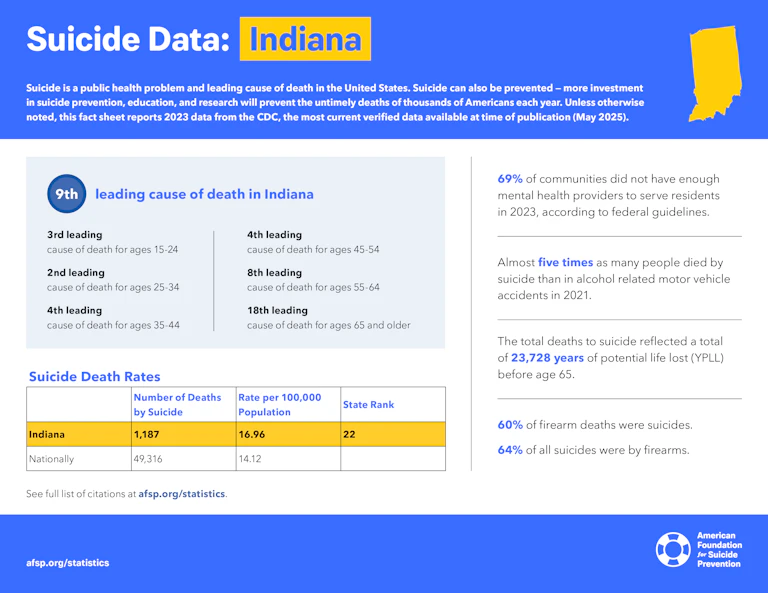Indiana

Indiana suicide prevention plans and initiatives
In 2017 Indiana law charged the Family and Social Services Administration Division of Mental Health and Addiction (DMHA) with developing a statewide suicide prevention program and mandated the creation of a state suicide prevention coordinator position within the Division to implement and maintain the program, including the development of a state suicide prevention plan (§12-21-5-5). In June 2021, DMHA released the Indiana Suicide Prevention Plan: July 1, 2021–June 30, 2023. The coordinator also facilitates the Indiana Suicide Prevention Network (ISPN) advisory council and participates in ISPN and Indiana Suicide Prevention Coalition activities. The Indiana Suicide Prevention Framework, presented by ISPN and supported by DMHA, and the DMHA’s Suicide Prevention Planning Tool were created and adopted to promote a systematic prevention approach and achieve the goal of zero suicides. In addition, Indiana Department of Health published a Suicide Resource Guide. In 2023, SB 1 tasked the Division of Mental Health and Addiction with overseeing the 988 Suicide and Crisis Lifeline, required Medicaid reimbursement for eligible certified community behavioral health clinic (CCBHC) services, and reestablished the Indiana behavioral health commission to, among other responsibilities, report on the progress and implementation of 988 and CCBHC services.
Indiana laws
Key:
- Required by law
- Encouraged by law
- No law in place
Crisis lines and 988 implementation
- Addresses 988 infrastructure and provides for telecom user fee
- Addresses 988 infrastructure but does not include telecom user fee
- 988 law limited to creating an exploratory commission, advisory committee, or task force
Mental health parity
- Public health plans (e.g., Medicaid) regularly submit parity compliance analyses to state regulators
- Private health plans (individual and group) regularly submit parity compliance analyses to state regulators
K – 12 school suicide prevention
- Inclusion of the 988 Suicide & Crisis Lifeline and/or other crisis line(s) on student ID cards
- Student allowances for excused mental health absences
- School personnel must report student suicide risk to a parent and/or guardian
- Suicide prevention and/or mental health training for certain school personnel, annual
- Suicide prevention and/or mental health training for certain school personnel, not annual
- Suicide prevention, intervention, and postvention policies/programming
- Student education on suicide prevention
Health professional training in suicide assessment, treatment and management
- Mental health professionals receive regular training
- Mental health professionals receive one time training
- Medical/surgical professionals receive regular training
- Medical/surgical professionals receive one time training
Conversion therapy bans
- Prohibits licensed/board certified mental health providers from engaging in conversion therapy with minors under 18 years of age
- Prohibits licensed/board certified mental health providers from engaging in conversion therapy with vulnerable adults
- Prohibits use of state funds for any purpose related to conversion therapy (e.g., conducting, making a referral for, or extending health benefits coverage for)
University and college campus suicide prevention
- Inclusion of the 988 Suicide & Crisis Lifeline and/or other crisis line(s) on student ID cards
- Students receive information on available mental health and/or suicide prevention services and/or resources
- Adoption of suicide prevention/awareness policy or program
Firearms
- Process for extreme risk protection orders (ERPOs)
- State voluntary do not sell list